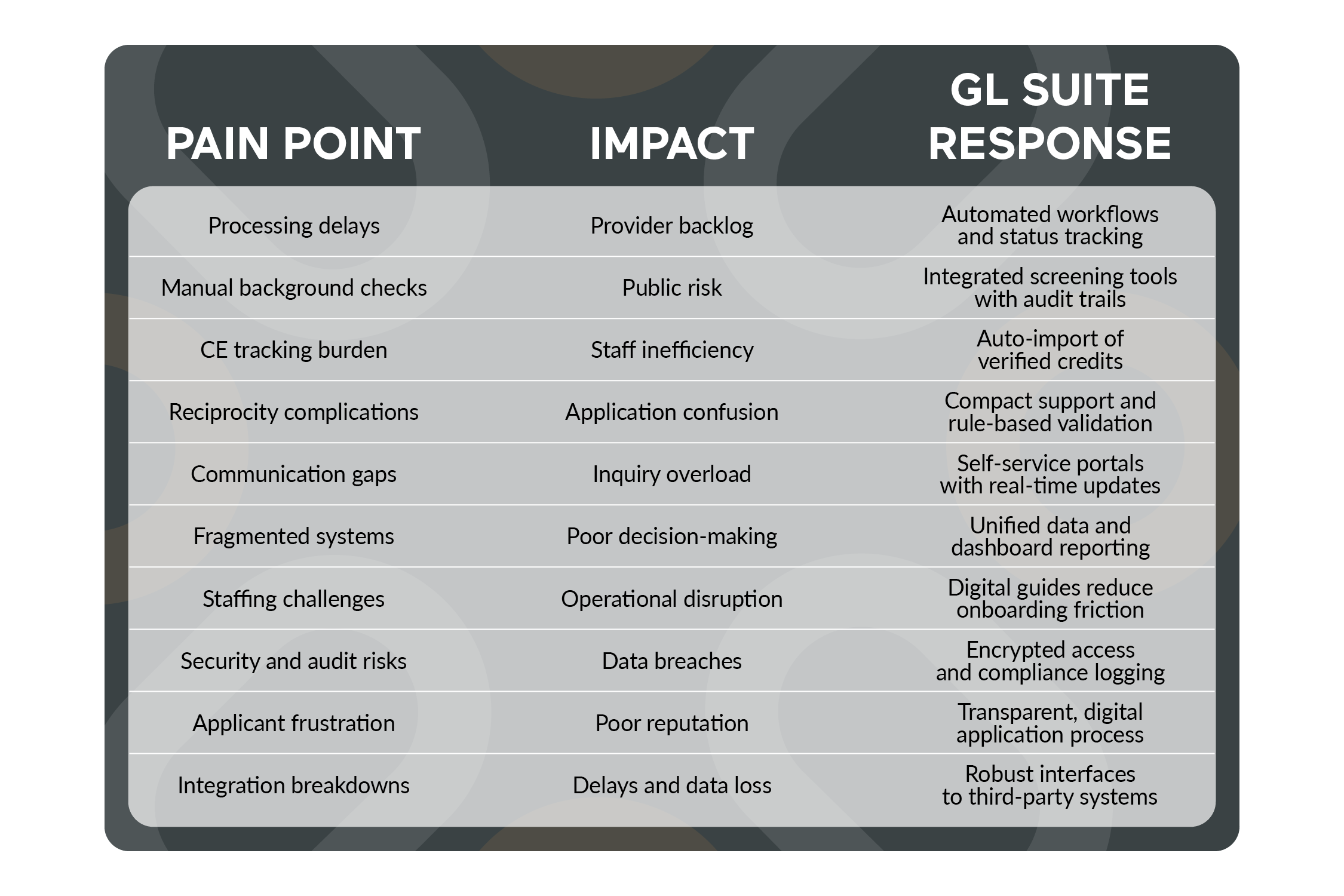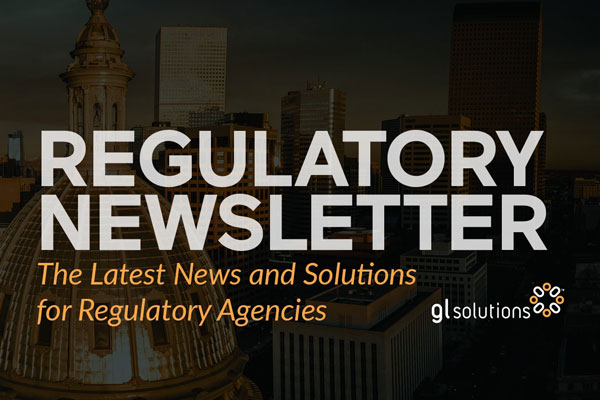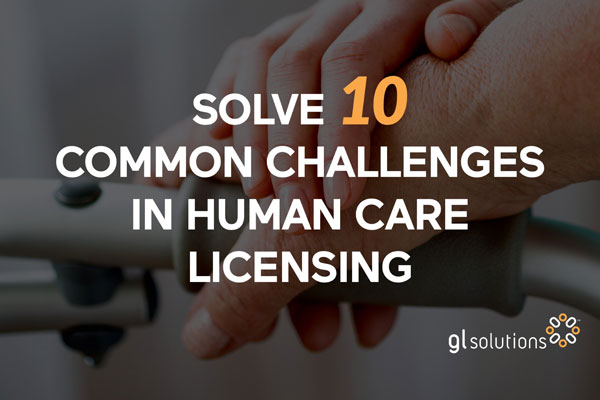Human care provider licensing agencies face a myriad of challenges that hamper efficiency, delay services and strain public trust. Outdated tools and manual processes create bottlenecks, leaving providers frustrated and communities underserved. Modernizing licensing systems with customized regulatory software resolves these pain points and restores agency performance.
1. Manual Processes Delay Application Approvals
Many licensing agencies still rely on spreadsheets, paper forms and disconnected databases to manage human care provider licensing. This outdated approach causes lost documents, inconsistent data and lack of visibility into licensee application status. Staff spend valuable time tracking missing paperwork instead of advancing approvals. These delays trickle down to clients waiting for care.
In New Jersey, some social workers reported waiting years beyond their application submission before receiving licenses. This inefficiency adds to workforce shortages and disrupts service delivery.
Solution: A modern software solution enforces document completeness, automates routing and updates status in real time. With streamlined workflows and better data validation, your agency reduces backlog and shorten turnaround time.
2. Background Screening Often Relies on Error-Prone Manual Checks
Provider vetting demands careful background screening. Many licensing agencies still rely on staff to manually verify criminal history and professional credentials. This process introduces human error, slows application progress and leaves gaps in public protection.
One agency error led to more than 5,800 licenses being issued despite criminal history checks that should have disqualified applicants.
Solution: Regulatory software integrates with FBI, state criminal databases and education providers. Automated background checks improve consistency, reduce risk and keep audit records secure and accessible.
3. Tracking Continuing Education Creates Extra Work and Errors
Licensing agencies must verify continuing education (CE) compliance during renewals. Many still require providers to submit certificates manually. Staff must sort through PDFs and spreadsheets, verify course content and hours and match requirements for each type of license.
Although CE mandates intend to safeguard service quality, research shows minimal impact on outcomes and significant administrative cost.
Solution: Modernization automates CE tracking by importing credits directly from approved providers. Policy rules enforce compliance before license issuance, helping agencies eliminate errors and streamline renewals.
4. Licensing Reciprocity and Compacts Add Complexity
Universal licensing recognition laws and multistate compacts aim to increase mobility for qualified professionals. However, these changes often add complexity to rule enforcement. Licensing systems must accommodate variable state requirements and conditional approvals.
A survey by the Council of State Governments showed that 55% of agencies believed universal licensing recognition improved workforce mobility, yet many reported confusion over requirements and challenges updating agency websites accordingly. Occupational licensing can suppress employment by as much as 29 percent, making these reforms even more critical.
Solution: The right software solution allows agencies to configure custom rule logic for reciprocity, validate external licenses and manage conditional approvals efficiently.
5. Communication Breakdowns Lead to Delays and Frustration
Applicants frequently contact licensing agencies to ask about application status, missing documentation or renewal deadlines. Without automated communication tools, staff must respond manually, often duplicating efforts and delaying action.
Disjointed messaging systems and a lack of status visibility frustrate providers and overwhelm agency staff.
Solution: Regulatory software resolves this by enabling secure online portals where applicants upload documents, track application status and receive automated updates. Reduced inquiry volume lets staff prioritize critical tasks.
6. Disconnected Systems Limit Insight and Oversight
Agencies that manage licensing data separately from compliance tracking, financial transactions and case management face operational blind spots. Generating performance reports for leadership or audits becomes difficult and time-consuming.
Solution: Modern, cloud-based systems improve interoperability, enable performance dashboards and support real-time reporting. They consolidate licensing, CE compliance and case management into a unified system. Built-in analytics expose inefficiencies, track progress and support continuous improvement.
7. Staffing Shortages Disrupt Continuity
Many agencies operate with insufficient staffing, particularly in IT and licensing roles. Training new hires requires significant time, while retiring employees take institutional knowledge with them. Workforce shortages pose serious challenges to maintaining operations.
According to NASCIO, staffing gaps rank among the top concerns for state agencies in 2025.
Solution: A modern system includes guided workflows that walk staff through licensing steps without constant oversight. These digital aids reduce training time, maintain consistency and scale operations more effectively.
8. Security Gaps Threaten Data Integrity
Human care licensing data includes sensitive personal and health-related information. Agencies must comply with HIPAA, SOC 2 and other cybersecurity frameworks. Older systems often lack proper encryption, access controls and audit capabilities.
Solution: Software solutions with GovRAMP-based security controls help agencies achieve compliance and reduce exposure to cyber threats. These types of solutions offer safeguards such as full data encryption, role-based access permissions and automated audit logging.
9. Negative Applicant Experiences Damage Public Perception
Delays in licensing renewals or approvals prevent qualified providers from practicing, which can disrupt careers and reduce access to care. Applicants often encounter confusing requirements, inconsistent processes or poor visibility into their application progress.
Long wait times have affected workers across the country. In some states, new graduates wait months—or years—before receiving licenses, delaying employment and exacerbating shortages.
Solution: A fully digital application experience with 24/7 access to status updates, online payments and document uploads improve transparency and increase satisfaction among providers and stakeholders.
10. Poor System Integration Slows Data Flow
Licensing agencies regularly exchange data with testing services, CE providers, payment processors and other external systems. Manual data reentry causes frequent errors and increases staff workload. Developing custom interfaces drains IT resources.
Solution: A modern system connects seamlessly with third-party vendors to automate data sharing, eliminate transcription and ensure data quality across systems.
Budget Constraints and Political Pressure Demand Results
Legislative oversight and public scrutiny often focus on licensing timelines, costs and barriers to entry. Agencies must produce performance metrics to defend budgets and demonstrate value. Recent studies suggest that excessive licensing requirements limit employment opportunities, but reforms like universal licensing recognition mitigate that impact.
Real-time automated dashboards give agencies the data needed to evaluate process efficiency, report compliance and support policy decisions.
A Clear Path Forward with GL Suite
Licensing agencies that handle human care providers operate at the front line of public protection. Yet common pain points—manual reviews, disconnected systems, workforce gaps and compliance complexity—restrict performance and increase risk.

Deliver Modern Licensing with Confidence
Human care licensing involves complex decisions that affect real people and families. With the right system in place, licensing and permitting agencies increase efficiency, safeguard public trust and adapt to changing laws.
GL Solutions has served regulatory agencies for over two decades with a focus on configurable, secure and purpose-built licensing systems. GL Suite empowers agencies to modernize licensing, reduce friction and improve service for applicants and communities alike. Contact us to learn more about how GL Suite supports adult care, child care, behavioral health and other essential human care services.
An advocate for effective government, CEO Bill Moseley has enjoyed decades of service as a congressional staffer, attorney, administrator at the Oregon Department of Justice, agency software expert and Bend city councilor. He cofounded GL Solutions in 1997 to help government agencies function better. Bill led the company through decades of growth, personally serving as project manager for numerous installations. Bill chairs GL Solutions’ Board of Directors.
Time to Modernize
GL Solutions helps your regulatory agency run, grow and adapt through modern software and automation that helps solve your agency’s greatest challenges. To learn more, contact us.
To receive the latest regulatory news delivered to your inbox each week, subscribe to our newsletter.




